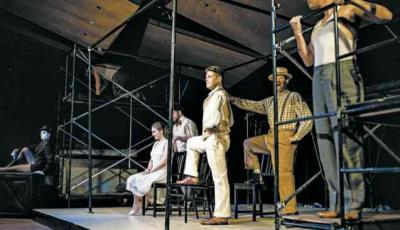'The Fantasticks': Innocence Lost, and Regained

On May 3, 1960, “The Fantasticks” opened at the Sullivan Street Playhouse in Greenwich Village, where it continued to play for the next 42 years, earning it the heavyweight belt of off-Broadway musicals.
This charming play can be seen now at the Southampton Cultural Center (we’ll return to that in a minute), but it was a brief sojourn to East Hampton shortly after its less-than-stellar opening that solidified its standing as the world’s longest-running musical.
With its deceptively simple melodies by Harvey Schmidt, minimalist sets and costumes, and two-piece accompaniment, the show was a far cry from the lushly orchestrated Broadway musicals of the day. “My Fair Lady,” “West Side Story,” and “The Music Man” were all running when “The Fantasticks” opened to lukewarm reviews in the cramped, four-row theater.
But Lore Noto, the producer, was invited to bring the fledgling show out to the John Drew Theater at Guild Hall for a one-week run. Thinking it would be a nice vacation before an inevitable closing, the cast and crew headed to the South Fork to perform.
As the show’s librettist, Tom Jones, told The New York Times critic Alvin Klein in 1981: “Our first [East Hampton] audiences were almost exclusively theater people, who saw something avant-garde in the way we used obvious theatrical devices. ‘Is this a strange, aberrant new form?’ they all wondered. Anne Bancroft and Elia Kazan and Jerome Robbins and Bob Fosse and Agnes de Mille came to see it and became active supporters. They mounted campaigns. When we returned to New York, everything was notably different. We hadn’t had a profitable week until that point.”
And so “The Fantasticks” became The Little Show That Could.
And now in Southampton, Michael Disher directs an able cast in a solid production. Daniel Becker leads the way as El Gallo, the swashbuckling narrator (a role originated by Jerry Orbach), who sets the stage for reminiscence with the show’s most famous number, “Try to Remember.”
Try to remember when life was so tender
That no one wept except the willow
Try to remember the time of September
When love was an ember about to billow
The plot is drawn directly from Edmond Rostand’s “Les Romanesques,” which was first adapted into English during the Victorian era as “The Fantasticks” by George Fleming, the pseudonym of a popular woman author of the day, Julia Constance Fletcher. It offers an exercise in reverse psychology as two neighboring widowers build a wall between their properties to virtually guarantee that their adolescent offspring, steeped in an effluence of romantic poetry and self-absorption, will fall in love.
The fathers stage the girl’s, Luisa’s “first-class rape,” another word for abduction, employing El Gallo and two aging actors, with Matt, the boy, rescuing her, thus ending the supposed feud and leading to a happy ending (the end of Act One). But, as El Gallo predicts, “the play is never done/ until we’ve all of us been burned a bit.”
The first act is performed by the light of a silvery cardboard moon, with Ben Miller’s lighting as romantic as it’s supposed to be. But the second act, under a glaring sun, reveals that the bloom is off the proverbial moonflower, as the fathers war for real and the children discover the deceit and subterfuge enacted upon them and go their separate ways.
However, all’s well that ends well, and a fantasy sequence during which the children experience the disillusionment of the outside world and man’s inhumanity to man provides an opportunity to return with a deeper love and authentic appreciation of each other.
Matt and Luisa‚ beautifully played by Adam Fronc and Ella Watts, dominate the stage as the epitome of youth and innocence; every song they perform, either together or alone, is a joy to hear and behold. Frances Sherman is The Wall, complete with sexy mime costume, and is captivating without saying a word. Richard Adler and David Hoffman, who prove their worth as the patriarchal clowns Hucklebee and Bellomy, get to perform two of the musical world’s funniest numbers, “Never Say No” and “Plant a Radish,” but the lyrics and intent of the songs are partially lost in a mishmash of distracting choreography too large for the stage. However, the choreographed movements during “Round and Round,” in which El Gallo warns Luisa of the outside world and Matt experiences its tribulations from behind a curtain, fits perfectly and adds an oomph to Act Two. The piece ends with the beautiful waltzy ballad “They Were You” and a reprise of “Try to Remember.”
Philip Reichert and Stephan Scheck as the aging players Henry and Mortimer bring Shakespearean comedy to the stage — the original Jay and Silent Bob. As recently as 2010, Tom Jones portrayed the part of Henry in a “Fantasticks” revival, a role he originated under the name Thomas Bruce. Mr. Becker plays the narrator El Gallo with a tongue-in-cheek panache. The cast is rounded out with Dustin James and Thomas Wheeler and Mr. Disher himself as the roustabouts; Karen Hochstedler and Miriam Shilling on piano and harp provide the music from the wings.
Mr. Disher directed “The Fantasticks” eight years ago, his first show at the S.C.C., and in his director’s program notes he acknowledges that the “seemingly simple show that requires no set” imparts the lesson to “seek, and stumble and regret and learn.”
“The Fantasticks” runs Thursdays through Sundays at the cultural center, through Oct. 18.
